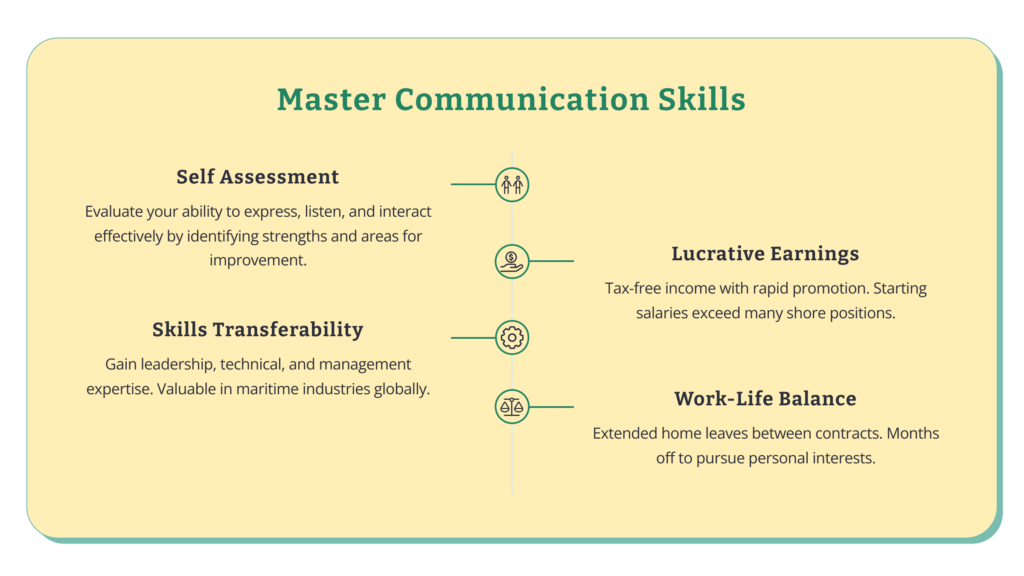
Quick Summary
Table of Contents
Effective communication is a fundamental skill that impacts both personal and professional success. Whether in the workplace, social interactions, or leadership roles, the ability to communicate clearly and confidently enhances relationships and career prospects. Understanding how to improve communication skills is essential, as strong communication contributes to better teamwork, problem-solving, and decision-making. Learning how to improve communication skills helps individuals build trust, express ideas effectively, and navigate challenges in any industry, making it a crucial asset for long-term success.
If you’re wondering how to improve your communication skills, this comprehensive guide will walk you through 15 essential skills and strategies to help you become a more confident and effective communicator. By implementing these techniques, you can build stronger connections, express your ideas clearly, and foster meaningful interactions.
Whether you are an experienced executive or an aspiring manager, this article will provide valuable insights and actionable tips to help you develop and master your communication skills. Let’s dive in and explore the world of communication skills for today’s leaders.
It is the ability to convey ideas, thoughts, and emotions clearly and efficiently, ensuring that the message is understood as intended. What is effective communication? It involves both verbal and non-verbal elements, including tone, body language, and active listening. What is effective communication if not the ability to not only speak but also understand the perspectives of others and respond appropriately? People with good communication skills can express themselves confidently, build strong relationships, and prevent misunderstandings in personal and professional settings. The importance of communication skills lies in their ability to foster teamwork, resolve conflicts, and enhance productivity in any environment.
Having good communication skills means being able to adapt to different audiences and situations while maintaining clarity and engagement. What is effective communication without active listening and empathy? It requires attentiveness, emotional intelligence, and the ability to give and receive feedback constructively. The importance of communication skills extends beyond verbal exchanges; it also includes written, digital, and interpersonal communication that shapes how individuals connect and collaborate. Whether in the workplace, social interactions, or leadership roles, mastering what is effective communication enhances collaboration, decision-making, and overall success.

Strong communication is a key factor in building successful personal and professional relationships. Whether in the workplace, social settings, or leadership roles, having the ability to convey ideas clearly and effectively is essential. Understanding communication skills examples can help individuals enhance their ability to listen actively, express thoughts confidently, and engage meaningfully with others. From verbal and nonverbal communication to written and digital interactions, mastering these skills leads to better collaboration and career growth. In this article, we will explore the top 15 strong communication skills to improve and how they can positively impact various aspects of life.
Active listening is more than just hearing words; it involves fully engaging with the speaker, understanding their message, and responding appropriately. This skill improves relationships, reduces misunderstandings, and fosters trust in conversations.
Emotional intelligence (EQ) is the ability to recognize, understand, and manage your own emotions while also being sensitive to others’ feelings. High EQ leads to better relationships and conflict resolution.
Non-verbal communication, including facial expressions, gestures, posture, and tone of voice, plays a crucial role in how messages are perceived.
| Nonverbal Cue | Meaning |
| Eye contact | Engagement, interest, attentiveness |
| Facial expressions | Emotions, attitudes, reactions |
| Body posture | Confidence, openness, attentiveness |
| Gestures | Emphasis, clarity, emphasis on key points |
| Handshakes | Professionalism, trust, confidence |
| Personal space | Comfort level, boundaries |
| Tone of voice | Emotions, intent, level of authority |
| Nodding | Agreement, understanding |
| Smiling | Friendliness, approachability |
| Mirroring | Rapport, connection |
| Fidgeting | Nervousness, restlessness |
| Crossing arms | Defensiveness, resistance |
Being direct and to the point ensures your message is understood without confusion.
Confident communicators inspire trust and credibility. Speaking with assurance helps convey your message more effectively.
Empathy allows you to connect with others by understanding their feelings and perspectives.
An open-minded communicator is willing to consider different perspectives, making discussions more productive and inclusive.
Providing and receiving feedback effectively promotes growth and improvement.
Different situations require different communication approaches.
Public speaking is a valuable skill for career growth and leadership roles.
Effective written communication ensures messages are clear, professional, and persuasive.
Good questioning techniques lead to better understanding and engagement in conversations.
Effective communication is key to resolving conflicts peacefully.
Networking requires effective communication to build and maintain professional relationships.
Working cooperatively with others, actively contributing, sharing ideas, and fostering a team-oriented approach to achieve common goals. Effective collaborators value diverse perspectives, actively listen, and communicate openly and respectfully. They leverage each team member’s strengths, encourage participation, and promote a supportive and inclusive environment. By fostering collaboration, individuals can harness the collective intelligence and creativity of the team, leading to innovative solutions and increased productivity.
Also Read: Barrier of Communication

Take the time to evaluate your communication skills by recognizing your strengths and areas for improvement. This self-reflection provides a foundation for your learning journey and helps you focus on specific areas that require attention.
To help you understand your abilities, here are a few questions you can ask yourself, and understand where you stand:
| How comfortable am I in expressing my thoughts and ideas clearly? |
| Do I actively listen to others or find myself interrupting frequently? |
| Am I aware of my nonverbal cues, such as body language and facial expressions, and how they impact communication? |
| How well do I adapt my communication style to different audiences and situations? |
| Do I effectively manage conflicts and disagreements through communication? |
| Am I able to convey empathy and understanding when interacting with others? |
| How confident am I in public speaking or presenting information to a group? |
| Do I actively seek feedback and incorporate it to improve my communication skill? |
| Do I actively seek feedback and incorporate it to improve my communication skills? |
| Do I communicate assertively and assert my boundaries when necessary? |
Seeking training and resources for communication skills is essential for continuous improvement and professional growth. Various online platforms, such as Coursera, LinkedIn Learning, and Chegg Skills, offer structured courses that focus on verbal, non-verbal, and written communication techniques. Engaging in workshops, attending public speaking sessions, and reading books on effective communication can also enhance skills. Additionally, practicing with communication coaches or joining groups like Toastmasters can provide hands-on experience and constructive feedback. Investing in these resources helps individuals refine their ability to express ideas clearly, actively listen, and build strong interpersonal relationships.
Active listening is a key component of good communication skills. It involves giving your full attention to the speaker, focusing on their words, tone, and nonverbal cues. Regularly practicing this skill improves understanding, fosters meaningful connections, and refines your communication interactions. The importance of communication skills in active listening cannot be overstated, as it helps build trust and reduces misunderstandings in both personal and professional settings.
Engage in role-playing exercises to simulate real-life communication scenarios. This method allows you to practice different communication techniques and receive constructive feedback from others. Role-playing improves adaptability, confidence, and clarity in various interactions. Seeking feedback helps you gain valuable insights into your strengths and areas for improvement, enabling you to refine your good communication skills further.
The importance of communication skills extends to continuous learning and improvement. Effective communication is a skill that develops over time, requiring consistent effort and practice. Engage in conversations, presentations, and writing exercises to refine your skills. Reflect on your experiences, identify areas for improvement, and make necessary adjustments to enhance your abilities. The more you practice, the more natural and impactful your communication will become.
Effective communication is one of the most crucial skills that can determine success in job hunting. From writing a compelling resume to acing interviews and networking with industry professionals, good communication skills play a vital role in every stage of the job search process. Employers seek candidates who can express themselves clearly, collaborate effectively, and build strong relationships within the workplace. Below are key reasons why the importance of communication skills cannot be overlooked in job hunting:
Your resume and cover letter serve as your first impression on potential employers. Strong communication skills help you present your qualifications, experience, and achievements concisely and persuasively. Using clear and compelling language ensures that your application stands out from the competition.
Interviews are the most critical stage of job hunting, and good communication skills can make a lasting impact on recruiters. The ability to articulate thoughts, answer questions confidently, and actively listen to interviewers helps establish a strong rapport. Employers look for candidates who can express their ideas effectively and demonstrate professionalism in their speech and body language.
Networking is a powerful tool in job hunting, and the importance of communication skills in professional networking cannot be overstated. Whether it’s attending job fairs, reaching out on LinkedIn, or conversing at industry events, strong communication helps you build meaningful connections that can lead to job referrals and career opportunities.
Once you secure a job offer, negotiation becomes a crucial step. The ability to clearly communicate your value, justify salary expectations, and negotiate terms professionally ensures that you get the best possible offer. Good communication skills allow you to express your worth without hesitation, helping you secure a favorable deal.
In today’s competitive job market, technical skills alone are not enough. Employers prioritize candidates who can collaborate, present ideas clearly, and contribute to a positive work environment. The importance of communication skills in job hunting lies in the ability to differentiate yourself by demonstrating confidence, adaptability, and professionalism.
Understanding how to improve communication skills is crucial for both personal and professional success. The ability to communicate clearly—both verbally and nonverbally—significantly influences relationships, teamwork, leadership, and career advancement. By actively listening, fostering empathy, and refining communication techniques, individuals can build stronger connections, resolve conflicts efficiently, and inspire those around them. Investing in continuous learning and leveraging resources such as Chegg Skills can provide valuable insights into developing practical and impactful communication abilities.
Communication is a lifelong learning process, and consistent improvement is key. By honing our skills, we enhance our relationships, increase self-confidence, and navigate the complexities of the modern world with clarity and ease. Embracing the principles of what is effective communication ensures long-term success in both personal interactions and professional environments.

By working for Chegg, you may also use these skills to earn extra money to cover your expenditures. Chegg allows for independent work for Q&A. The best aspect of this opportunity is the freedom to work whenever and wherever you choose. You can become a subject matter expert with Chegg.
Ans. Communication skills are essential for building strong relationships, resolving conflicts, collaborating with others, and achieving success in various personal and professional endeavours.
Ans. To improve communication skills, practice active listening, enhance clarity in speech, develop confidence, and work on non-verbal communication. Engaging in regular conversations and seeking feedback also help refine communication abilities.
Ans. Empathy plays a crucial role in communication as it involves understanding and connecting with others’ emotions. By expressing empathy, you can establish rapport, foster understanding, and build stronger relationships.
Ans. Yes, communication skills can be learned and developed through self-assessment, practice, seeking guidance from resources such as courses or training programs, and incorporating feedback to refine and enhance your abilities.
Ans. List your professional talents in order of importance, starting with communication. Give illustrations of your ability to communicate both verbally and in writing. Please describe how you can negotiate or discuss commercial arrangements. Explain how you encouraged people to collaborate to finish a project in time.
Ans. Non-verbal cues such as eye contact, facial expressions, and gestures influence how messages are received. Positive body language helps reinforce spoken words and makes interactions more engaging.
Ans. ommon barriers include lack of clarity, distractions, cultural differences, poor listening skills, and misinterpretation of messages. Addressing these barriers improves communication efficiency.

Authored by, Amay Mathur | Senior Editor




Amay Mathur is a business news reporter at Chegg.com. He previously worked for PCMag, Business Insider, The Messenger, and ZDNET as a reporter and copyeditor. His areas of coverage encompass tech, business, strategy, finance, and even space. He is a Columbia University graduate.
Editor's Recommendations
Chegg India does not ask for money to offer any opportunity with the company. We request you to be vigilant before sharing your personal and financial information with any third party. Beware of fraudulent activities claiming affiliation with our company and promising monetary rewards or benefits. Chegg India shall not be responsible for any losses resulting from such activities.
Chegg India does not ask for money to offer any opportunity with the company. We request you to be vigilant before sharing your personal and financial information with any third party. Beware of fraudulent activities claiming affiliation with our company and promising monetary rewards or benefits. Chegg India shall not be responsible for any losses resulting from such activities.